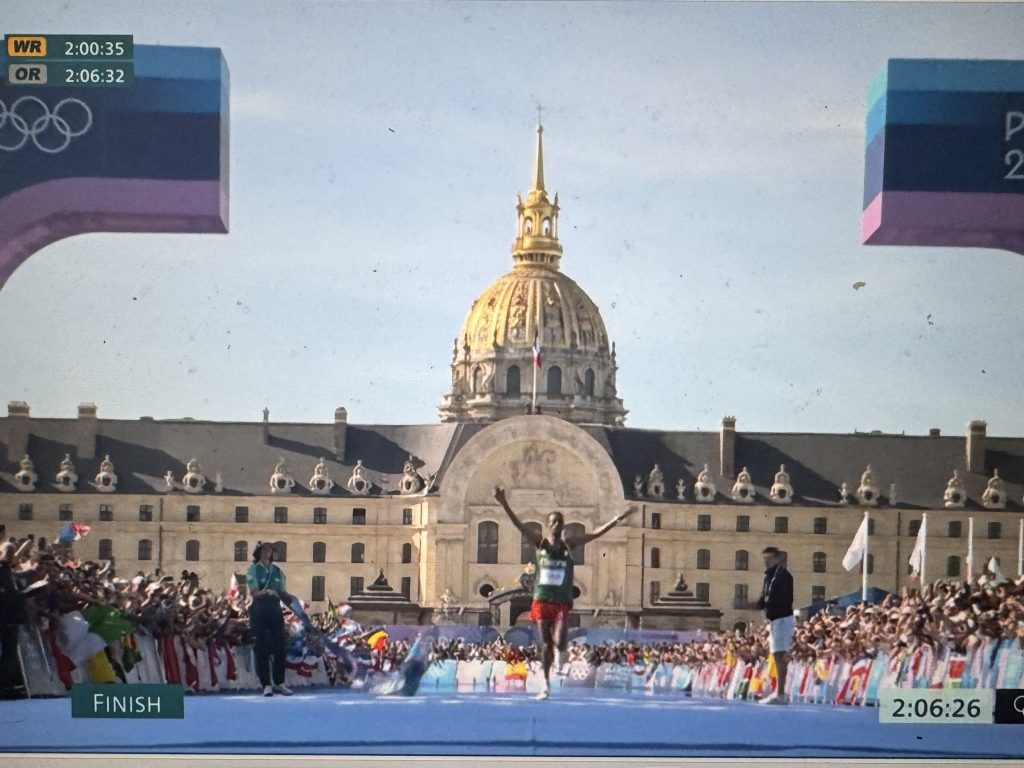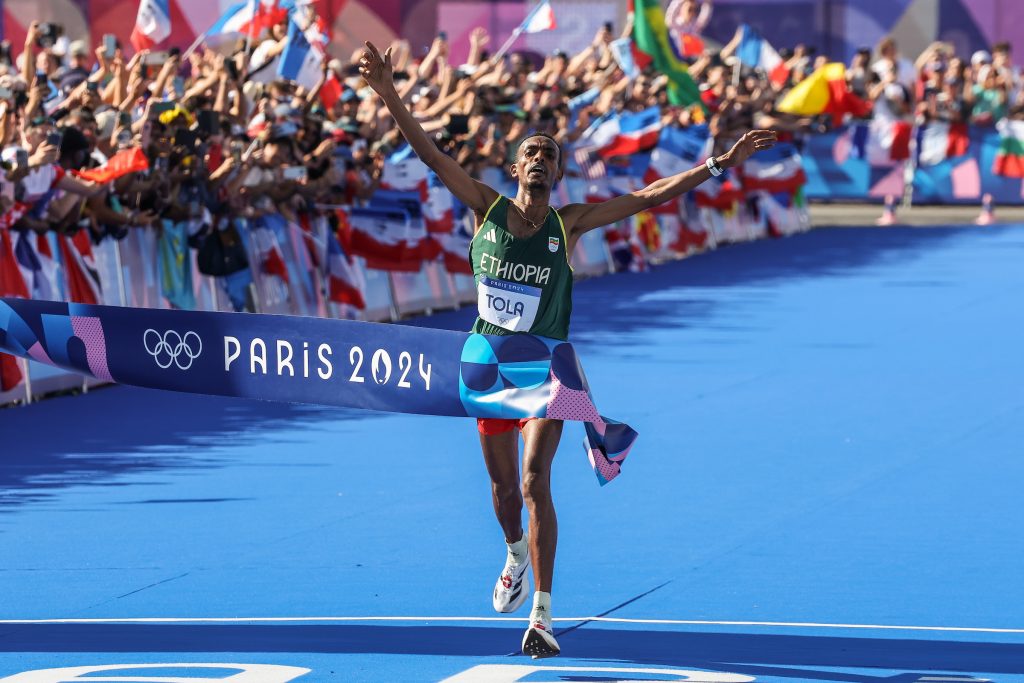A Late Injury Substitution, Tamirat Tola Conquers Paris’ Hills, Wins 2024 Olympic Marathon In Spectacular 2:06:26 OR
By Jonathan GaultPARIS – Barely two weeks ago, he was not even supposed to run the Olympic marathon. But after a late withdrawal by his countryman and training partner Sisay Lemma, 32-year-old Tamirat Tola, an injury replacement, tamed the toughest course in Olympic history on Saturday morning by running a remarkable 2:06:26 to win gold and break Sammy Wanjiru’s famous Olympic record from 2008.
Tola’s win was much-needed for Ethiopia, whose distance runners have struggled during the Olympics with only a pair of silvers on the track so far (Tsige Duguma in the 800 and Berihu Aregawi in the 10,000). Tola is the first Ethiopian man to win the Olympic marathon since Gezahegne Abera in Sydney 24 years ago.
Tola made his winning move up the monstrous “Wall Hill” just past the commune of Chaville, the toughest of the Paris course’s three major hills, averaging a 10.5% grade (with some portions as high as 14%) just after 28 kilometers. By the time he reached the summit, Tola had splintered a 15-man chase pack and he led by 17 seconds at 30 kilometers, a gap that would never appreciably shrink the rest of the way as he went on to win by 21 seconds over silver medalist Bashir Abdi (2:06:47) of Belgium, the European marathon record holder who upgraded the bronze he won in Sapporo three years ago. Tokyo Marathon champion Benson Kipruto of Kenya was third in 2:07:00 with Emile Cairess 4th, the best finish by a Brit in an Olympic marathon since Jon Brown (also 4th) in 2004.
The times were surprisingly fast on a course defined by its hills, adding up to 1,437 feet of vertical gain and 1,430 feet of loss. Americans Conner Mantz and Clayton Young both ran close to their personal bests, 2:08:12 and 2:08:44, respectively, times their coach Ed Eyestone believed would be enough to land on the podium. Instead, they finished 8th and 9th. The third American Leonard Korir was 63rd in 2:18:45. (More on the Americans in a separate article here).
Two legends of the sport had a tougher day at the office. 42-year-old Kenenisa Bekele, making his first Olympic appearance in 12 years, fell off the pace around 10k and would finish 39th in 2:12:24. Two-time defending Olympic champion Eliud Kipchoge, 39, who dealt with pain in his hip and back, fell off from the lead pack during the first big hill at 16k and would ultimately drop out of the race after 31k – his first career DNF.
Eliud Kipchoge at 31k, dropping out after waiting for last-place Ser-Od Bat-Ochir pic.twitter.com/qzGvYA0F8u
— Japan Running News (@JRNHeadlines) August 10, 2024
The race
With an 8 a.m. start time, the temperatures were on the cooler side for an Olympic marathon (62 degrees at the start, climbing to high 60s by the finish) but the sunny skies and humidity (86%) meant that many runners were still taking heat prevention measures, with Kipchoge, Abdi, and a number of others wearing specialized cooling headbands and athletes frequently grabbing bags of ice to cool themselves at aid stations.
Italy’s Eyob Faniel made the first move, opening a gap just after 10k, and he led by 23 seconds at 15k (45:38), but he was soon joined by Tola and Mantz, and the trio passed halfway together in 64:51 with a seven-second lead on a large chase pack having summitted two of the three big uphills. Shortly after that, they reached the Palace of Versailles before turning around and heading back to Paris on the loop course.
The third uphill would determine the gold medal. Tola had used the hill at 20k to bridge the gap to Faniel, and now he attacked ferociously up the comically steep Wall Hill, which resembled the slow incline of a rollercoaster. No one could answer, and by 30k, just after the summit, Tola had a 17-second lead thanks to a 15:03 5k split from 25-30k – a segment with a net uphill of roughly 120 feet. He did not relent down the steep downhill that followed, ripping the next 5k segment in 14:02 (1:58:25 marathon pace) as the runners lost more than 400 feet of elevation.
Tola would wind up running a big negative split of 64:51/61:35 to win gold, crossing the finish line at Les Invalides on a spectacular morning in Paris. The main drama in the final miles surrounded the silver and bronze, a three-man race between Abdi, Kipruto, and Seville Marathon champ Deresa Geleta of Ethiopia. Abdi eventually broke both just before 40k, and while Kipruto would hold on for bronze, Geleta was spent and Cairess would charge by for 4th place.
Top 10 Results *Full Results
| pos | Country | Athlete | mark |
| 1 | ETH | Tamirat TOLA | 2:06:26 OR |
| 2 | BEL | Bashir ABDI | 2:06:47 SB |
| 3 | KEN | Benson KIPRUTO | 2:07:00 |
| 4 | GBR | Emile CAIRESS | 2:07:29 |
| 5 | ETH | Deresa GELETA | 2:07:31 |
| 6 | JPN | Akira AKASAKI | 2:07:32 PB |
| 7 | LES | Tebello RAMAKONGOANA | 2:07:58 NR |
| 8 | USA | Conner MANTZ | 2:08:12 SB |
| 9 | USA | Clayton YOUNG | 2:08:44 SB |
| 10 | ERI | Samsom AMARE | 2:08:56 SB |
Quick Take: Tola was absolutely sensational today on an extremely challenging course
 Nine months ago, Tola showed he can handle the hills by running 2:04:58 to break Geoffrey Mutai’s hallowed course record at the New York City Marathon. But the hills in Paris were much longer and steeper. How would he handle them? Just fine, thank you very much. Tola said he is used to training on uphills and downhills in Sendafa, Ethiopia, and he looked strong throughout the race, even while climbing up the big hills.
Nine months ago, Tola showed he can handle the hills by running 2:04:58 to break Geoffrey Mutai’s hallowed course record at the New York City Marathon. But the hills in Paris were much longer and steeper. How would he handle them? Just fine, thank you very much. Tola said he is used to training on uphills and downhills in Sendafa, Ethiopia, and he looked strong throughout the race, even while climbing up the big hills.

Tola is no hill specialist, however. Rather, he is an incredible all-around runner. He was the Olympic 10,000 bronze medalist in 2016, he has two medals in the Worlds marathon (2017 silver and 2022 gold), and he has also won on flat courses in Dubai (2017) and Amsterdam (2021). He can do it all.
But he almost was not in this race. Tola dropped out of last year’s World Championship marathon and this spring’s London Marathon, which meant that, despite his stellar run in NYC, he was not named to Ethiopia’s Olympic team. But as the alternate, Tola still made sure to get himself in good shape. When Sisay Lemma, the Boston Marathon champ who trains as part of Tola’s group under coach Gemedu Dedefo, developed a hamstring injury that left him unable to race in Paris, Tola was ready to step in.
“Sisay told me that it was better for him to drop out and for me to compete,” Tola said. “He said, ‘You can do better than me in my condition.’ It is thanks to him, this victory also belongs to him for giving me this opportunity.””
A noble gesture that resulted in Ethiopia’s first Olympic marathon gold since 2000.
Quick Take: Bashir Abdi said the downhills were the hardest part
Few runners are more consistent than Belgium’s Bashir Abdi, who has now medalled in the last three global championships he has competed in (2021 Olympics, 2022 Worlds, 2024 Olympics) and has only finished off the podium in one of his last nine marathons. Formerly overshadowed by Mo Farah in their Gary Lough-coached training group, Abdi emerged from that shadow long ago and can always be counted on to deliver in the biggest races.
“I expected the uphills would be the most challenging one, but the downhill was the most challenging today,” Abdi said. “It was so steep, you don’t have control of your body.”
Quick Take: The times today were shockingly fast
Given how much the Olympic course was hyped beforehand, it was a huge shock to see Sammy Wanjiru’s 2:06:32 Olympic record broken on this day. Ed Eyestone thought it would take 2:08 to medal and fourth-placer Emile Cairess said he thought it would take 2:10, which is what it usually takes. In the last four Olympic marathons before today, the bronze has been won in right around 2:10:00.
Bronze medal times, last five Olympics
2008: 2:10:00
2012: 2:09:37
2016: 2:10:05
2021: 2:10:00
2024: 2:07:00
Yet today, you needed to run 2:07:00 or faster to get on the podium. What happened?
The weather certainly helped. The 62-degree start temperature was cooler than a typical Olympic marathon and 16 degrees cooler than Sapporo last year and 10 degrees cooler than Rio in 2016. And the leaders in the first half ran more aggressively than a typical Olympic marathon – today’s opening half of 64:58 was faster than Sapporo (65:13) or Rio (65:55) despite the big uphill just before halfway.
Before the race, we estimated the course would run 3-4 minutes slow compared to a flat marathon. That may have proved accurate, since World Marathon Majors are usually won in 2:02 or 2:03 these days. But those races also have pacers, and today’s race did not, so it’s still something of a surprise that Tola was abe to run so fast.
Quick Take: Bekele, who battled a hamstring injury today, says he will keep racing after the Olympics
Bekele said he prepared well for the Olympics, similar to his buildups ahead of Valencia and London, and was healthy going into Paris. But he developed a hamstring issue early in the race, around 10-15k, that caused him to drop back early and he was never really in it from there.
Bekele was proud to have returned to the Olympic stage after 12 years away but could not help but feel that he would have done better had he been named to the Ethiopian team in 2016 (when he was 34) or 2021 (when he was 39) as opposed to now.
“I was supposed to race maybe Tokyo or Rio, but I couldn’t get the chance to do that,” Bekele said. “This is too late, I think. So I missed those chances.”
Bekele did say he was proud of his countryman Tola for bringing home the gold.
“I’m really happy,” Bekele said. “…This is the first gold that Ethiopia won [in Paris] so I think this is fantastic.”
As for his future plans, Bekele said he plans on running marathons beyond the Olympics.
Quick Take: Kipchoge compared today’s race to getting knocked out early in a boxing match
This was Eliud Kipchoge’s first DNF in 23 career marathons (including his two sub-2:00 exhibition attempts). Kipchoge said his preparation had gone well but that physically, he was not right today, battling pain in his hip early in the race. He dropped from the lead pack during the first set of hills and then developed back pain at 20k, which ultimately became too much for Kipchoge to handle and caused him to drop out. He compared the experience to a boxing match.
“Like boxing, you can go to the camp for boxing for five months and you are knocked out in two seconds,” Kipchoge said.
Kipchoge, who also ran poorly on the hilly Boston course last year, maintained that the hills in Paris were not the problem for him today.
“[The hills] didn’t affect me at all,” Kipchoge said. “The pain [in my back] made me drop.”
Kipchoge turns 40 in November and admitted after this race that he will have to spend the next three months evaluating a path forward.
“I want to go back, try to evolve,” Kipchoge said. “If I don’t evolve, then I do other things…I don’t know what my future holds.”
But when we asked him if he planned on running marathons in 2025, he said, “Absolutely.”
More on the US Men: Training Partners Conner Mantz & Clayton Young Finish Top 10 in 2024 Olympic Marathon
Talk about the race on our world-famous fan forum / messageboard:
- Official Paris Olympic marathon men’s thread The course lived up to the hype. Despite the huge hills, Tamira Tola, who only got on the Ethiopian team a few days ago, somehow broke the Olympic record by running 2:06:26. Americans Conner Mantz (2:08:12, 8th) and Clayton Young (2:08:44, 9th) were fantastic. Kenenisa Bekele was 39th (2:12:44). Eliud Kipchoge was DNF.
- Tamirat MF Tola wins olympic marathon with new OLYMPIC RECORD🥇🔥
- CONNOR MANTZ AND CLAYTON YOUNG TOP 10🔥🔥🔥 A great run for two of the Americans.
- Emile Cairess will bring home a UK Olympic marathon medal This prediction almost became true as the Brit was 4th.
- NBC cuts off marathon coverage before 20 people finish
- Eluid Kipchoge DNFed the 2024 Olympic Marathon
- Paris is an instant World Marathon Major if they run that course every year with some big $$$$
- Mantz is about to medal!


